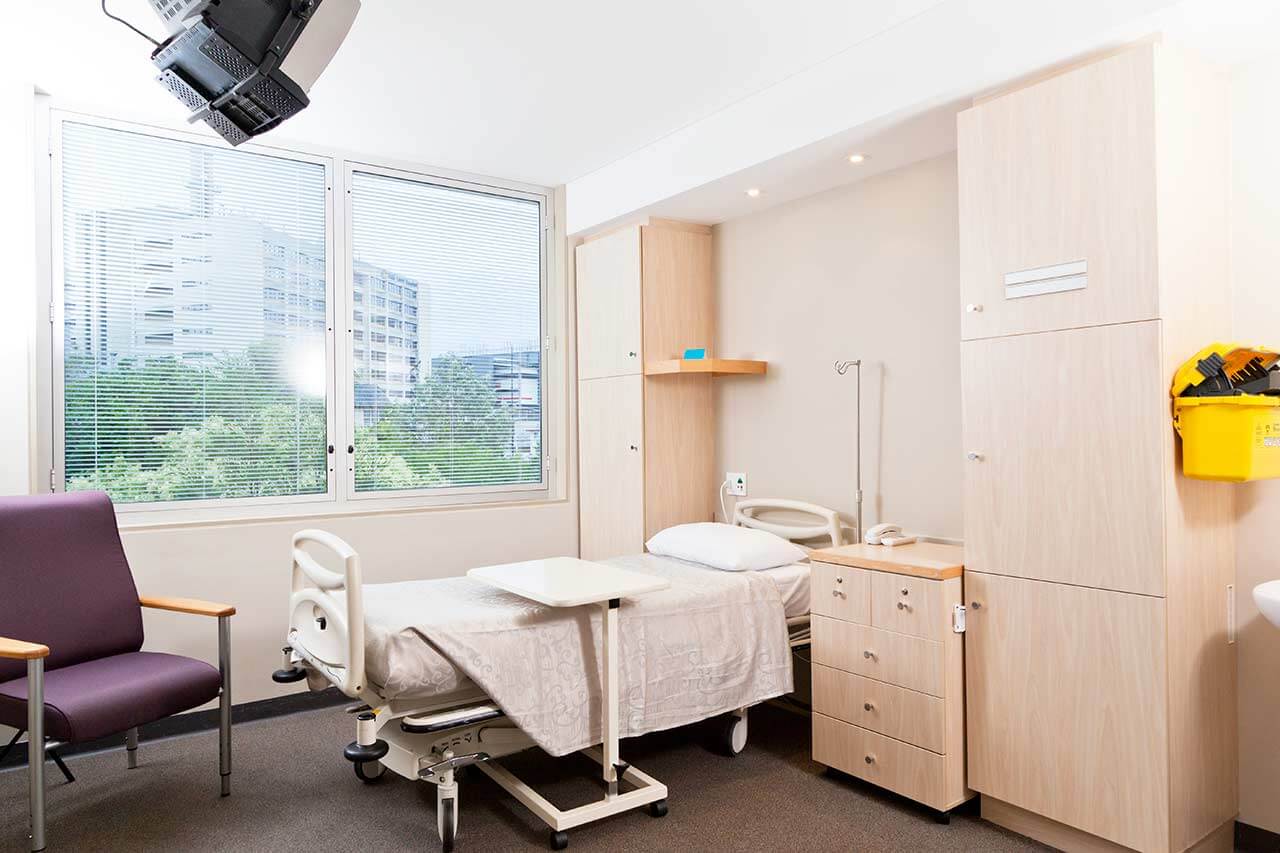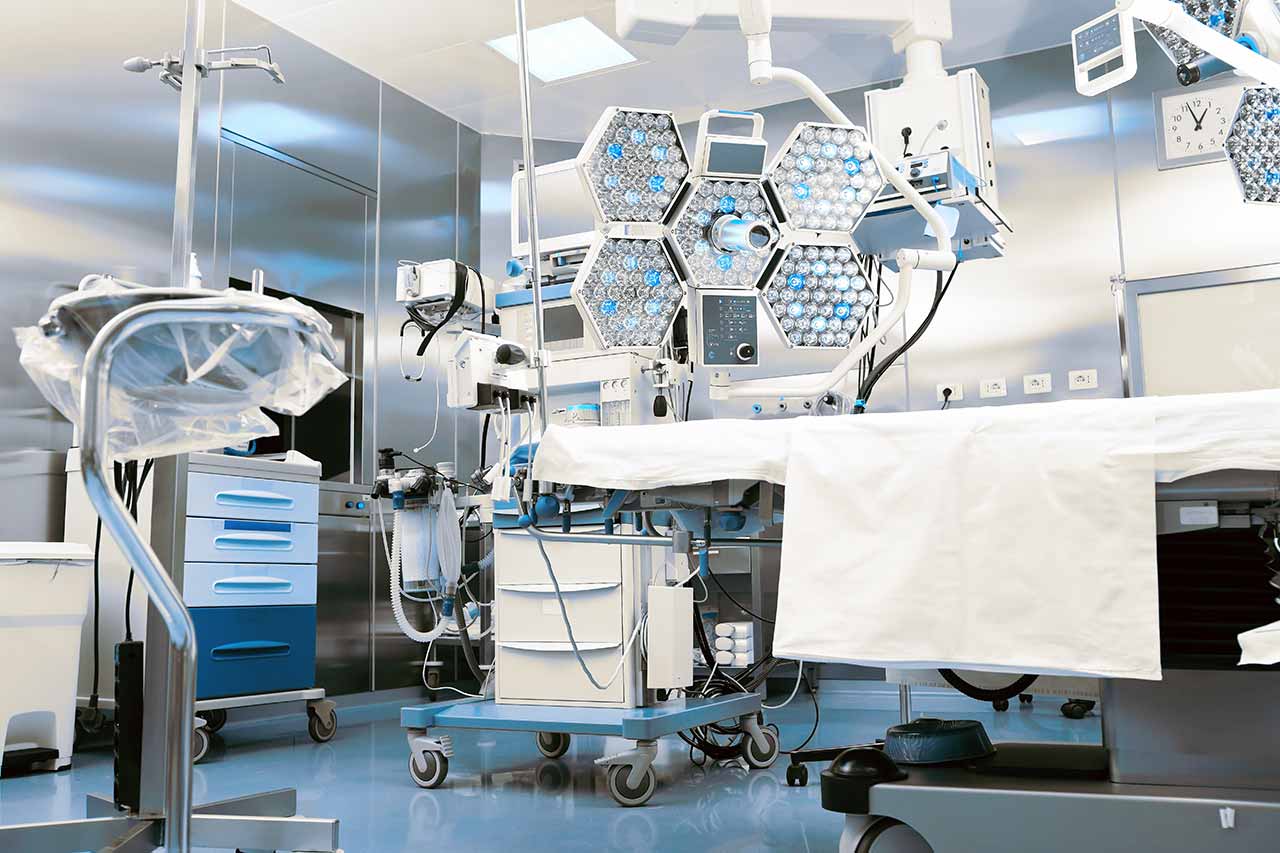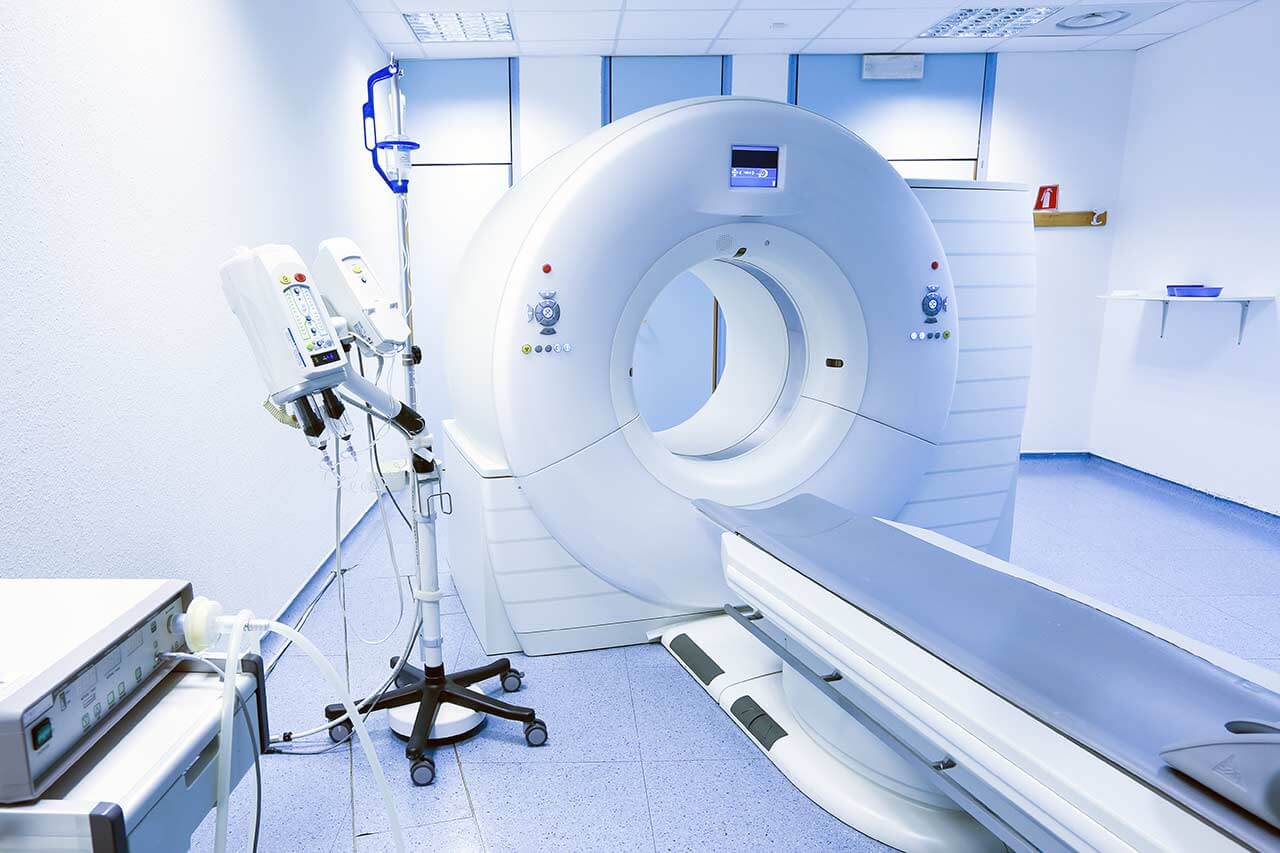
The program includes:
- Initial presentation in the hospital
- Clinical history taking
- Review of medical records
- Physical examination
- Laboratory tests:
- complete blood count
- biochemical analysis of blood
- tumor markers
- indicators of inflammation
- coagulation tests
- Ultrasound scan of the abdomen
- Differential diagnosis with other diseases
- Chemotherapy (1 course)
- Cost of essential medicines
- Nursing services
- Consultation of related specialists (tumor board)
- Treatment by chief physician and all leading experts
- Elaboration of further recommendations
How program is carried out
During the first visit, the doctor will conduct a clinical examination and go through the results of previous laboratory tests and instrumental examinations. After that, you will undergo an additional examination, including laboratory assessment of liver and kidney function, ultrasound scan. Based on the received results, the doctor will elaborate the chemotherapy regimen. If necessary, related medical specialists will be involved in the elaboration of a treatment regimen (tumor board).
Chemotherapy is carried out as the day hospital procedure, without mandatory admission to the hospital. After the placement of a venous catheter, you will stay in a comfortable ward. An infusion system will be connected to the catheter, through which the required drug or a drug combination will be administered. All drugs are administered by intravenous drip, slowly, so the total duration of the infusion can be up to several hours. All this time, doctors and nurses will monitor your health condition closely.
After the course of chemotherapy, you will stay under medical supervision in the ward for a few more hours. If your general condition is good, your doctor will allow you to leave the hospital. You will receive the medical report with detailed recommendations regarding further treatment. In the future, you will be able to have a distant consultation with your attending physician and schedule the next course of chemotherapy, if necessary.
Service
You may also book:
 BookingHealth Price from:
BookingHealth Price from:
About the department
The Department of Oncology and Hematology at the Beta Clinic Bonn offers the full range of medical services in the fields of its competence. The department's team of doctors specializes in the diagnostics and treatment of benign and malignant hematopoietic diseases and solid tumors of various organs and anatomical structures. An accurate examination is the key to successful treatment, so specialists have the latest technology to perform diagnostic procedures for suspected cancer. The patients of the department have access to advanced laboratory diagnostics, image-guided tests, ultrasound scans, endoscopic procedures, biopsies, and other procedures. Oncological diseases are treated in accordance with current clinical protocols and using advanced methods, including chemotherapy, immunotherapy, hormone therapy, etc. Each treatment regimen is carefully developed based on the patient's clinical data, needs, and wishes. The department's oncologists and hematologists cooperate closely with specialists from related fields, including surgeons, radiologists, experts in nuclear medicine, gastroenterologists, gynecologists, urologists, and other doctors. An interdisciplinary approach allows the specialists to provide patients with optimal results. An important role is also assigned to the humane attitude towards the patient and moral support, since the treatment process is often quite complicated.
The Head Physician of the department is Prof. Dr. med. Marcus Gorschlüter. The specialist has over 20 years of successful clinical experience in cancer treatment, so he has the courage to take on complex cancer cases. Prof. Gorschlüter lectures at the University of Bonn and is actively involved in the German Society of Hematology and Medical Oncology (DGHO).
The team of oncologists at the medical facility treats patients with solid tumors, including colon, lung, stomach, liver, thyroid, gallbladder, ovarian, uterine, cervical, prostate, brain, skin, and other tumors. The first-line therapy for these cancers is usually tumor resection surgery. The operation is performed by experienced, highly specialized surgeons. The department's specialists are responsible for the conservative treatment of cancers with various localizations. Oncologists at the medical facility most often perform chemotherapy and immunotherapy.
Chemotherapy is one of the most effective treatments for most types of cancer. The department's oncologists most often prescribe chemotherapy to patients in the form of infusions or injections. It is also possible to take oral chemotherapy drugs. The department's doctors determine the optimal regimen for chemotherapy, taking into account the particular type of cancer, its stage, and the patient's general health condition. The principle of action of chemotherapy is to slow down or stop the growth of the tumor under the influence of chemotherapeutic agents. However, when injected into the human body, chemotherapeutic agents affect not only tumor cells but also healthy ones, so during the course of treatment, the patient encounters a number of side effects. These include nausea, vomiting, diarrhea, hair loss, extreme fatigue, damage to the mucous membranes of the mouth and throat, etc. Despite the side effects, chemotherapy allows doctors to achieve an excellent therapeutic result, and healthy cells that have been affected during treatment are restored quite quickly.
The department's medical team also specializes in immunotherapy, which is an innovative and highly effective treatment. Targeted antibody therapy is a type of immunotherapy. This therapy is often included in the treatment regimen for patients with lung, colon, stomach, ovarian, uterine, and other cancers. Antibodies are part of the human immune system. They are able to find specific molecules in the body and bind to them. First, the department's oncologists produce special monoclonal antibodies in the laboratory that are able to bind to certain proteins on the surface of cancer cells and block their growth and reproduction. The antibodies are then administered into the patient's body by injection or infusion. Once in the body, antibodies target cancer cells, thereby destroying the malignant tumor. Targeted antibody therapy can be used in combination with other treatments or as a standalone method. In some cases, it allows doctors to achieve a good result when other treatment methods are ineffective in the fight against cancer.
The department's medical team is also involved in treating benign and malignant blood diseases. The most common blood cancers are leukemias, lymphomas, and chronic myeloproliferative diseases. Chemotherapy is the main treatment for these types of cancer. The duration of the course of chemotherapy is 2-4 weeks. In some cases, chemotherapy can be carried out on an outpatient basis, but more often than not, the department's doctors still prefer inpatient treatment in order to be able to monitor the patient's condition and, if necessary, provide him with care.
The department specializes in the diagnostics and treatment of the following diseases:
- Malignant solid tumors
- Gastrointestinal cancer
- Malignant colon tumors
- Malignant stomach tumors
- Malignant esophageal tumors
- Malignant rectal tumors
- Malignant liver tumors
- Malignant gallbladder tumors
- Gastrointestinal stromal tumors
- Cancer of the male reproductive system
- Malignant prostate tumors
- Malignant testicular tumors
- Malignant penile tumors
- Cancer of the female reproductive system
- Malignant uterine and cervical tumors
- Malignant ovarian tumors
- Malignant vulvar tumors
- Endocrine cancer
- Malignant thyroid tumors
- Malignant parathyroid tumors
- Malignant adrenal tumors
- Cancer of the central nervous system
- Malignant brain tumors
- Malignant spinal cord tumors
- Lung cancer
- Bladder cancer
- Kidney cancer
- Skin cancer
- Bone and soft tissue cancer
- Oral and maxillofacial cancer
- Neuroendocrine tumors
- Gastrointestinal cancer
- Malignant blood diseases
- Leukemia
- Lymphomas
- Chronic myeloproliferative diseases
- Multiple myeloma
- Benign blood diseases
- Anemia
- Thrombocytopenia
- Other diseases
The department's therapeutic options include:
- Chemotherapy
- Immunotherapy
- Targeted antibody therapy
- Targeted therapy with kinase inhibitors
- Hormone therapy
- Blood component transfusions
- Palliative care
- Other medical services
Curriculum vitae
Higher Education and Professional Career
- 07.1986 - 09.1987 Military Service, Combat Medic in SanBtl 3 and FlaRgt 3 Hamburg, Germany.
- 10.1987 - 11.1994 Medical studies at the University of Cologne, Germany.
- 03.1989 - 03.1994 Study of the emergence of the German nation.
- 10.1993 - 09.1994 Training at the District Hospital in Dormagen, Germany (optional course in Anesthesiology).
- 10.1995 Thesis: "Determination of cytokine serum levels in classical Hodgkin's lymphoma", University Hospital Cologne, Germany.
- 03.1995 - 09.2001 Assistant Physician and Research Fellow at the Medical Clinical Institute and Outpatient Clinic at the University of Bonn, Germany; specialization: hematology and oncology (malignant blood diseases, solid tumors; outpatient department: gastroenterology, cardiology, intensive care, and internal medicine).
- 1995 - 2008 Research activity: infectious diseases in patients with immunodeficiency; immunotherapy and genetic therapy of malignant tumors; multiple myeloma, and malignant lymphomas.
- Since 09.2001 Head of the Cytology Laboratory.
- 10.2001 Board certification in Internal Medicine.
- 05.02 Practice in Hematology and Oncology in the Department of Internal Medicine.
- 10.2002 Venia Legendi. Habilitation on the subject: "Abdominal infections in patients with hematological malignancies."
- 10.2003 Part-time course "Intensive Healthcare Management Course" MIBEG Institute Cologne, Germany.
- 06.2004 Radiation protection course (emergency diagnostics).
- 07.2006 - 06.2011 Senior Physician in the Department of Internal Medicine at the University Hospital Bonn, Germany.
- 03.2007 Additional qualification in Blood Transfusion.
- 01.2008 Work in the Department of Oncology, UK.
- 06.2008 Professorship at the University of Bonn, Germany.
- 09.2009 Establishment of a Private Practice for Hematology and Oncology in Bonn, Germany; temporary part-time employment in addition to work as a Senior Physician at the University Hospital Bonn, Germany; start of cooperation with the Beta Clinic Bonn.
- Since 07.2011 Work on a permanent basis in Private Practice.
- Since 04.01.2014 Head of the Department of Oncology and Hematology at the Beta Clinic Bonn.
Lecturer Activities
- Lecturer at the University of Bonn, Germany.
Memberships in Professional Societies
- German Society for Haematology and Medical Oncology (DGHO).
Photo of the doctor: (c) Beta Klinik Service-, Verwaltungs- und Forschungs- GmbH
About hospital
The Beta Clinic Bonn is a modern private healthcare facility with 20 specialized departments. In addition, the clinic cooperates with 30 independent doctors of various specializations, most of whom have their own private practices. The doors of the clinic first opened for patients in 2008. Since that time, the medical facility has expanded significantly and achieved outstanding success. It harmoniously combines state-of-the-art equipment, high levels of competence among doctors, and comfortable infrastructure. All these possibilities make it possible to provide patients with high-quality medical care in accordance with modern European standards. The work of the medical team at the clinic is based on the following principle: "Our task is to take care of the health of patients." The clinic provides comprehensive treatment, taking into account the individual needs and wishes of each patient.
The hospital has an excellent diagnostic base: rooms for instrumental diagnostics, imaging tests, and endoscopic procedures. The medical complex also has in-house laboratories with advanced equipment. The clinic's doctors have the opportunity to perform comprehensive diagnostics in the shortest possible time and detect the slightest pathological changes in the work and structure of the internal organs. When considering the diagnostic results in complex clinical cases, physicians from related specialties are often involved in the process so that all important aspects are taken into account when developing a treatment regimen for a patient.
The therapeutic options at the clinic are quite diverse. At the same time, doctors always strive to keep pace with innovations, carrying out treatment using the most modern and sparing techniques. The operating rooms at the clinic have advanced computer equipment, navigation devices, monitoring systems, surgical microscopes, special tools, and equipment for laparoscopic and endoscopic interventions, as well as laser systems. The clinic also has an in-house Rehabilitation Center, where patients undergo physiotherapy and therapeutic exercises.
The clinic is expanding more and more every year. Innovative developments in diagnostics and treatment are immediately introduced here. It is worth noting that the clinic is a pioneer in Germany in advanced laser treatment for epilepsy. The therapy was implemented into clinical practice in 2019 and has been successfully applied here since then.
Photo: (с) depositphotos
Accommodation in hospital
Patients rooms
The patients of the Beta Clinic Bonn live in comfortable single rooms. Each room has a separate bathroom with a shower and toilet. The rooms have a modern design and meet the standards of a high-class hotel. For the convenience of patients, the rooms are equipped with electrically adjustable beds, air conditioning, satellite and Internet TV, a telephone, and Wi-Fi.
The clinic also offers accommodations in enhanced comfort rooms. Such patient rooms have a more refined design. In addition, they are very spacious. Enhanced comfort rooms have a minibar, daily fresh fruit, and a special dinner menu. Most windows of the clinic's patient rooms offer a beautiful view of the Rhine River and beautiful green landscapes.
Meals and Menus
The patients of the clinic are offered balanced, delicious food: a buffet breakfast, a hearty three-course lunch, and a light dinner. Also, for dinner, one can taste special offers from the chef at the hospital restaurant, which, if desired, can be served to the patient room.
Further details
Standard rooms include:
Accompanying person
Your accompanying person may stay with you in your patient room or at the hotel of your choice during the inpatient program.
Hotel
You may stay at the hotel of your choice during the outpatient program. Our managers will support you for selecting the best option.
In the immediate vicinity of the clinic is the Kameha Grand, a five-star hotel. The exterior and interior of the hotel impress with their beauty. In addition, the hotel is famous for its excellent service. The hotel is located on the banks of the Rhine and offers picturesque views from its windows.





